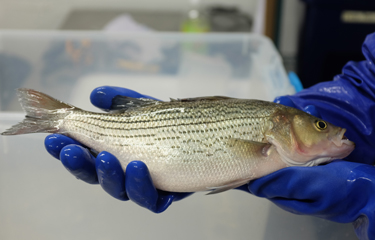Originally founded in 2013 as Edenworks and previously known as Seed & Roe, Brooklyn, New York, U.S.A.-based Upward Farms takes an ecosystem-based approach to its aquaponics operation, which produces microgreens and “mercury-free, antibiotic-free, and hormone-free” striped bass, rated as a “Best Choice” by the Monterey Bay Aquarium Seafood Watch program. In an interview with SeafoodSource, Upward Farms CEO Jason Green described the company’s whole ecosystems as “a paradigm shift in productivity and scalability compared to status quo production methods dependent upon synthetic chemicals.” The company has had success selling its greens into New York City grocery outlets including Whole Foods Market, but has not yet sold any fish commercially. Green said the company has a “20-year vision to create a sustainable future for the food system by advancing the importance of the microbiome in both indoor and outdoor agriculture.” Upwards Farms recently closed on more than USD 15 million (EUR 12.8 million) in new funding, led by an investment from Prime Movers Lab.
SeafoodSource: Why was striped bass chosen as the complementary species in Upward Farms’ integrated aquaponics system?
Green: We’re an aquaponic farm – we grow fish and plants together in a closed ecosystem. It’s important for us to use a freshwater species instead of saltwater so we can directly utilize the waste from the fish as fertilizer for our leafy greens production. The striped bass hybrid that we use is a freshwater fish that retains the quality and character that eaters of striped bass love – clean, firm flesh with just the right amount of richness and skin that crisps up beautifully. Striped bass is also a fish that has a strong local following in the New York area, so there’s a baseline level of consumer awareness. So while chefs and consumers in New York are already familiar with striped bass as a wild local fish that is available seasonally, we sought to complement that with a sustainably farmed alternative that can be sourced year-round.
SeafoodSource: Can you say more about the company’s new facility and your other expansion plans?
Green: Our new headquarters facility is based in Greenpoint, Brooklyn, and will be a fully automated vertical farm with aquaponic production. It will serve as our commercial facility, distributing leafy greens and fish to grocers across the New York City area. Our new headquarters is also where we’ll continue to conduct research and development to advance our technology and develop new products.
Longer-term goals include opening a farm outside every major metropolitan area, near distribution centers that serve the grocers for that area. This will enable us to cut down on how far food travels. This is a key objective of ours, given that 95 percent of U.S. leafy greens are trucked in from California or Arizona, and 90 percent of fish is imported from other countries. All those miles between farm and form compromise quality, safety, and cost. In cutting down food miles, we can create a more transparent, stable, and safe supply chain. The importance of local production is something that COVID has really underscored. Add on top of that the risks posed by climate change, especially this year with record wildfires in the American West. In agriculture, as we’ve seen in medicine and other industries related to the public health response, the importance of short, stable supply chains is being recognized now more than ever.
SeafoodSource: What role will the fish side of things play in the company’s future development?
Green: The fish play an important and symbiotic role in our process. The fish are the source of fertilizer for our plants and the fuel for the microbiome that drives our competitive advantage. Our microbiome allows us to deliver higher produce yields, a disease resistance product, and superior food safety by preventing the growth of foodborne bacteria like E. Coli. In the long term, we anticipate our fish being a major source of revenue in and of itself. Given that fish farming is the largest and fastest growing food segment globally, and that local fish is the number-one consumer demand, yet 90 percent is imported and 40 percent is mislabeled, we see this as a blue ocean opportunity, pun intended.
SeafoodSource: What is the fish-growing capacity at the farm?
Green: We’d like to pass on this as we’re not currently sharing this information publicly.
SeafoodSource: When will they be commercially available?
Green: Our fish will be commercially available in New York City by mid-2021.
SeafoodSource: Has the company’s Monterey Bay Aquarium’s “Best Choice” rating been affected at all by the changes being made to the Seafood Watch Program?
Green: According to the Monterey Bay Aquarium’s Seafood Watch Program, striped bass continues to be a “Best Choice” when farmed in indoor recirculating tanks with wastewater treatment, like our aquaponic production.
SeafoodSource: How will the recent hiring of former RBC Capital Markets Managing Director and Co-Head of Real Estate Investment Banking John Perkins as Upward Farms’ new chief financial officer affect your company’s goals and fundraising efforts?
Green: With our purpose of enabling everyone to nourish their body, family, and the planet, we are fortunate to have John join our team and together achieve massive scale and impact. John's unparalleled talent and experience, particularly in capitalizing the real estate and infrastructure that transformed the American food supply chain, will help Upward Farms attract the right capital partners, grow rapidly, and realize the full potential of our vision and technology platform.
Photo courtesy of Upward Farms







